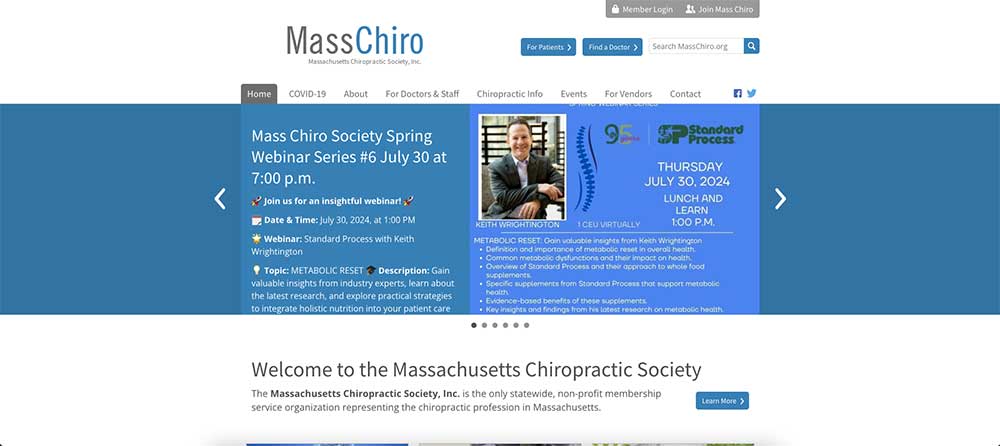Massachusetts
Chiropractic Information

Massachusetts Chiropractic Summary
A chiropractor may examine, evaluate, and diagnose patients of all ages for the purpose of determining the presence or absence of illnesses, injuries, conditions or disorders including, but not limited to, the vertebral subluxation complex/segmental and somatic dysfunction.
Licensing Requirements
Post-Licensing Education
Continuing Education requirements
12 hours required every year. All hours may be completed online.
requirements for educators
A continuing education course or program shall be approved for continuing education credit if it meets all of the following requirements: (a) The course or program meets the standards established and recognized by the Board; (b) The course or program is sponsored by a CCE-accredited chiropractic school or college; a state, regional or national professional society or association in the field of chiropractic; or an institution of higher learning accredited by the United States Department of Education; (c) The subject matter of the course or program is devoted to matters of clinical proficiency, philosophy and ethics, Massachusetts jurisprudence, or the human and biological sciences; and (d) The sponsoring party ensures that attendance is checked at least twice per session, and provides written certification of attendance, including number of hours attended, to the chiropractor and to the Board upon request. Link: https://www.mass.gov/doc/233-cmr-3-continuing-education-requirements/download
Are PACE courses accepted for continuing education requirements?
YES
Massachusetts requires examinations through the National Board of Chiropractic Examiners
Part I, Part II, Part III, Part IV, Physiotherapy, Acupuncture, Spec
State Chiropractic Online Resources
Regulatory Authority
Board of Registration of Chiropractors:
https://www.mass.gov/orgs/board-of-registration-of-chiropractors
Chiropractic Statutes and Regulations
Rules and Regulations:
https://www.mass.gov/lists/statutes-and-regulations-chiropractors
State Government Resources
State Legislature Homepage
State Legislature Bill Search Tool
Legislative member roster
State Governor's Office
Secretary of State
Office of the Insurance Commissioner
State Associations
State Chiropractic Coverage
Worker’s Compensation
Massachusetts Workers Compensation: https://www.mass.gov/workers-compensation-for-injured-workers
Massachusetts Workers Compensation Medical Rates: https://www.mass.gov/info-details/medical-rates-under-the-workers-compensation-act
Medicaid
Mass Health: https://www.mass.gov/topics/masshealth
New Mass Health Provider Enrollment: https://www.mass.gov/new-masshealth-providers
Chiropractor Manual for MassHealth Providers: https://www.mass.gov/lists/chiropractor-manual-for-masshealth-providers
Practice Options
| Perform extremity adjustments? | Y |
| Provide nutritional advice? | Y |
| Provide manipulation under anesthesia? | Y |
| Provide school enrollment exams? | Y |
| Provide sports physical exams? | Y |
| Provide return to play exams (including concussion protocol) for sports participation? | N/A |
| Perform US Department of Transportation exams? | Y1 |
| Treat animals? | N/A |
| Perform acupuncture? | Y2 |
| Perform dry needling? | Y3 |
| Perform intraoral TMJ treatments? | Y |
| Perform internal coccyx adjustments? | Y |
| Are there limits to body areas DCs are allowed to examine and/or treat? | Y4 |
| Are there limits on diagnostic tools DCs are allowed to use? | N/A |
| Perform venipuncture? | Y |
| Perform casting? | Y |
Qualifications:
1. A chiropractor can perform a Department of Transportation (DOT) physical exam if they are a certified medical examiner (CME) listed on the Federal Motor Carrier Safety Administration’s (FMCSA) National Registry.
2. Practitioners must have completed at least two years of post-graduate, professional experience prior to the addition of trigger point acupuncture/dry needling. Five hundred didactic hours and 150 clinical hours total shall be required training for the practice of dry needling/trigger point acupuncture.
3. Practitioners must have completed at least two years of post-graduate, professional experience prior to the addition of trigger point acupuncture/dry needling. Five hundred didactic hours and 150 clinical hours total shall be required training for the practice of dry needling/trigger point acupuncture.
4. The practice of chiropractic does not include operative surgery, prescription or use of drugs or medicines, the practice of obstetrics, the treatment of infectious diseases, and internal examinations, whether or not diagnostic instruments are used, except that the X-ray and analytical instruments may be used solely for the purpose of chiropractic examinations. Link: https://www.legis.la.gov/legis/Law.aspx?p=y&d=93782




